(完整版)从句连接词判断方法
(完整版)三大从句中常用连接词的对比
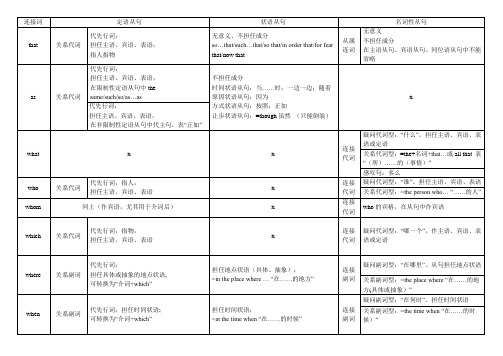
连词,担任状语或表语
=no matter when无论何时
x
however
x
连词,担任状语或表语
=no matter how无论怎样
连接副词
较少,担任状语,如:I’ll give you however much money you need.
whether
x
引导让步状语从句,Whether…or…无论……还是……
从属连词
不担任成分;表“是否”
if
x
引导条件状语从句,表“如果”
从属连词
仅用于宾语从句,不担任成分;表“是否”
as if /as though
x
引导方式状语从句,表“似乎”
从属连词
用于表语从句,It seems/looks/appears as if …表“似乎”,
连接词
定语从句
状语从句
名词性从句
=anything that “任何……的事”
whoever
x
连词,担任主语、宾语、表语
=no matter who无论谁
连接代词
担任主语、宾语、表ຫໍສະໝຸດ ,=anyone who “任何……的人”
whomever
x
连词,担任宾语
=no matter whom无论谁
连接代词
担任宾语,
=anyone who “任何……的人”
whom
同上(作宾语,尤其用于介词后)
x
连接代词
who的宾格,在从句中作宾语
which
关系代词
代先行词;指物;
担任主语、宾语、表语
x
连接代词
疑问代词型:“哪一个”,作主语、宾语、表语或定语
引导名词性从句的连接词
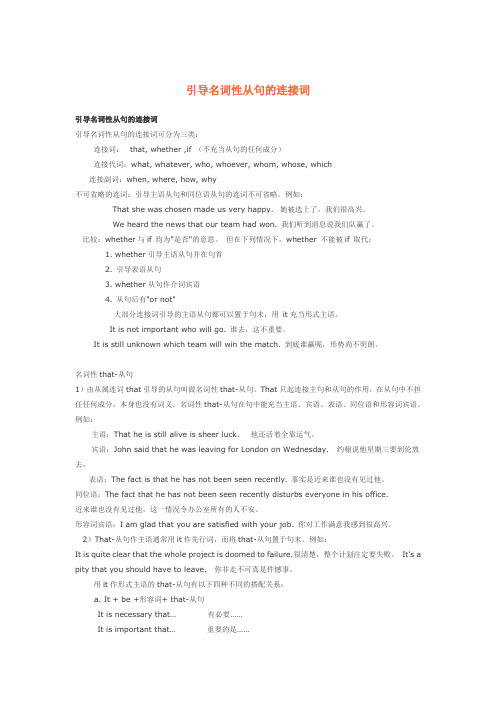
引导名词性从句的连接词引导名词性从句的连接词引导名词性从句的连接词可分为三类:连接词:that, whether ,if (不充当从句的任何成分)连接代词:what, whatever, who, whoever, whom, whose, which连接副词:when, where, how, why不可省略的连词:引导主语从句和同位语从句的连词不可省略。
例如:That she was chosen made us very happy. 她被选上了,我们很高兴。
We heard the news that our team had won. 我们听到消息说我们队赢了。
比较:whether与if 均为"是否"的意思。
但在下列情况下,whether 不能被if 取代:1. whether引导主语从句并在句首2. 引导表语从句3. whether从句作介词宾语4. 从句后有"or not"大部分连接词引导的主语从句都可以置于句末,用it充当形式主语。
It is not important who will go. 谁去,这不重要。
It is still unknown which team will win the match. 到底谁赢呢,形势尚不明朗。
名词性that-从句1)由从属连词that引导的从句叫做名词性that-从句。
That只起连接主句和从句的作用,在从句中不担任任何成分,本身也没有词义。
名词性that-从句在句中能充当主语、宾语、表语、同位语和形容词宾语。
例如:主语:That he is still alive is sheer luck.他还活着全靠运气。
宾语:John said that he was leaving for London on Wednesday.约翰说他星期三要到伦敦去。
表语:The fact is that he has not been seen recently. 事实是近来谁也没有见过他。
英语中宾语从句用法及例句总结(完整)

宾语从句用法及其例句宾语从句用法时态:1.主句用一般现在时,从句可用任意时态。
2.主句用过去时,从句用过去某个时态。
3.主句用过去时,从句是客观真理时,只用一般现在时。
一、宾语从句的连接词从属连词连接宾语从句的从属连词主要有that,if,whether.that引导表示述句的宾语从句,if和whether引导表示“是否”的一般疑问句的宾语从句.He told me (that he would) go to the college the next year他告诉我他明年上大学.I don’t know if there will be a bus any more.我不知道是否还会有公交车.Nobody knew whether he could pass the exam.没人知道他是否会通过考试.连接代词连接代词主要有who, whom ,whose ,what ,whoever ,whomever ,whosever, what ever, whichever等.连接代词一般指疑问,但what, whatever除了指疑问外,也可以指述.Do you know who has won Red Alert game?你知道是谁赢得了红色警报的游戏?The book will show you what the best CEOs should know.这本书会告诉你最好的执行总裁该了解些什么.Have you determined whichever you should buy,a Motorola or Nokia cell phone?你决定好是买诺基亚还是摩托罗拉的了吗?连接副词连接副词主要有when,where,why,how,whenever,wherever,however等.He didn’t tell me when we should meet again.他没有告诉我什么时候我们能再见面.Could you please tell me how you use the new panel?你能告诉我怎么用这个新的操作盘吗?None of us knows where these new parts can be bought.没有人知道这些的新的零件能在哪里买到.二、动词的宾语从句大多数动词都可以带宾语从句We all expect that they will win , for members of their team are stronger.我们都预料他们会赢,因为他们的队员更强壮.He told us that they would help us through the whole work.他告诉我们在整个工作中,他们都会帮忙的.部分“动词+副词”结构也可以带宾语从句I have found out that all the tickets for the concert have been sold out.我发现这场音乐会的所有票都卖光了.Can you work out how much we will spend during the trip?你能计算出这次旅行我们将花费多少钱吗?动词短语也可以带宾语从句常见的这些词有:make sure确保make up one’s mind下决心keep in mind牢记Make sure that there are no mistakes in your papers before you turn them in.在上交试卷前确保没有任何错误.可运用形式宾语it代替的宾语从句①动词find,feel,consider,make,believe等后面有宾语补足语的时候,则需要用it做形式宾语而将that宾语从句后置.I think it necessary that we take plenty of hot water every day .我认为每天多喝开水是有必要的.I feel it a pity that I haven’t been to the get-together.我没去聚会,感觉非常遗憾.I have made it a rule that I keep diaries.我每天写日记成了习惯.We all find it important that we (should) make a quick decision about this ma ter.我们都认为对这件事马上做出决定很重要.②有些动词带宾语从句时需要在宾语与从句前加it这类动词主要有:hate, take , owe, have, see to.I hate it when they with their mouths full of food.我讨厌他们满嘴食物时说话.He will have it that our plan is really practical.他会认为我们的计划确实可行.We take it that you will agree with us.我们认为你会同意我们的.When you start the engine, you must see to it that car is in neutral.开启发动机时, 一定要使汽车的离合器处于空挡位置.③若宾语从句是wh-类,则不可用it代替We all consider what you said to be unbelievable.我们都认为你所说的是不可信的.We discovered what we had learned to be valuable.我们发现我们所学到的东西都是有用的.三、介词的宾语从句用wh-类的介词宾语从句We are talking about whether we admit students into our club.我们正在讨论是否让学生加入我们的俱乐部.The new book is about how Shenzhou 6 manned spaceship was sent up into space.这本新书是关于神州6号载人航天飞船是如何升入太空的.用that,if引导的介词宾语从句有时候except,but,besides三个介词后可见到that引导的宾语从句I know nothing about my new neighbor except that he used to work with a p any.对于我的新邻居我只知道他曾在一家公司上班,其他一无所知.四、形容词的宾语从句常用来引导宾语从句的形容词有: sure,certain,glad,please,happy,sorry,afraid,satisfi ed,surprisedI am sure I will pass the exam.我确信我会通过考试.I am sorry that I have troubled you so long.很抱歉我这么长时间在打扰你.He is glad that Li Ming went to see him when he was ill.他很高兴在他生病的时候明能去看望他.五、if,whether在宾语从句中的区别①if和whether在作“是否”解时,引导宾语从句常放在动词know,ask,care,wonder,find o ut等之后,介词后一般不用if②少数动词,如:leave,put,discuss,doubt后的宾语从句常用whether.③whether后可以加or not,但是if不可以.④在不定式前只能用whether.(如:I can’t decide whether to stay. 我不能决定是否留下。
名词性从句连接词,及四种从句 全面

一、引导名词性从句的连接词引导名词性从句的连接词可分为三类:连接词:that,whether,if 不充当从句的任何成分)连接代词:what, whatever, who, whoever, whom,whose, which.连接副词:when, where, how, why不可省略的连词:1. 介词后的连词2. 引导主语从句和同位语从句的连词不可省略。
That she was chosen made us very happy.We heard the news that our team had won.比较:whether与if 均为"是否"的意思。
但在下列情况下,whether 不能被if 取代:1. whether引导主语从句并在句首2. 引导表语从句3. whether从句作介词宾语4. 从句后有"or not"Whether he will come is not clear.大部分连接词引导的主语从句都可以置于句末,用it充当形式主语。
It is not important who will go.It is still unknown which team will win the match.二. 主语从句作句子主语的从句叫主语从句。
主语从句通常由从属连词that,whether,if和连接代词what,who,which,whatever,whoever以及连接副词how,when,where,why等词引导。
that 在句中无词义,只起连接作用;连接代词和连接副词在句中既保留自己的疑问含义、又起连接作用,在从句中充当从句的成分。
例如:What he wants to tell us is not clear. 他要跟我们说什么,还不清楚。
Who will win the match is still unknown. 谁能赢得这场比赛还不得而知。
中考英语分类复习练习宾语从句用法详解
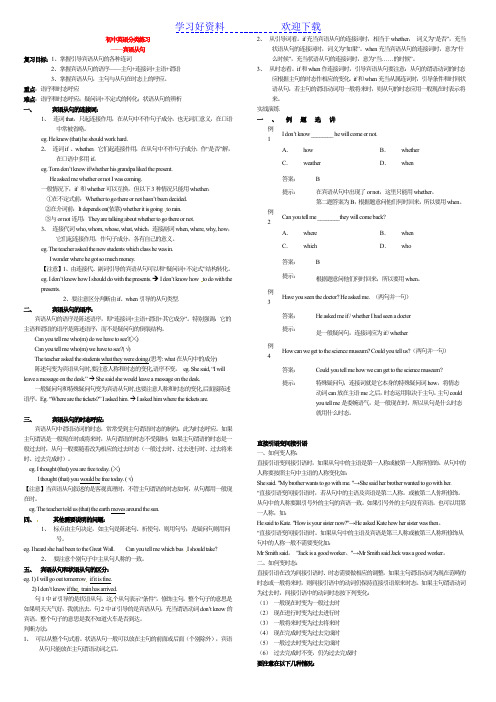
初中英语分类练习——宾语从句复习目标:1、掌握引导宾语从句的各种连词2、掌握宾语从句的语序——主句+连接词+主语+谓语3、掌握宾语从句,主句与从句在时态上的呼应。
重点:语序和时态呼应难点:语序和时态呼应;疑问词+不定式的转化;状语从句的辨析一、宾语从句的连接词:1、连词that,只起连接作用,在从句中不作句子成分,也无词汇意义,在口语中常被省略。
eg. He knew (that) he should work hard.2、连词if 、whether,它们起连接作用,在从句中不作句子成分,作“是否”解,在口语中多用if。
eg. Tom don’t know if/whether his grandpa liked the present.He asked me whether or not I was coming.一般情况下,if 和whether可以互换,但以下3种情况只能用whether:①在不定式前:Whether to go there or not hasn’t been decide d.②在介词前:It depends on(依靠) whether it is going to rain.③与or not连用:They are talking about whether to go there or not.3、连接代词who, whom, whose, what, which,连接副词when, where, why, how,它们起连接作用,作句子成分,各有自己的意义。
eg. The teacher asked the new students which class he was in.I wonder where he got so much money.【注意】1、由连接代、副词引导的宾语从句可以和“疑问词+不定式”结构转化。
eg. I don’t know how I should do with the presents. →I don’t know how to do with the presents.2、要注意区分判断由if、when引导的从句类型.二、宾语从句的语序:宾语从句的语序是陈述语序,即“连接词+主语+谓语+其它成分”。
英语中宾语从句定语从句用法及例句总结(完整)
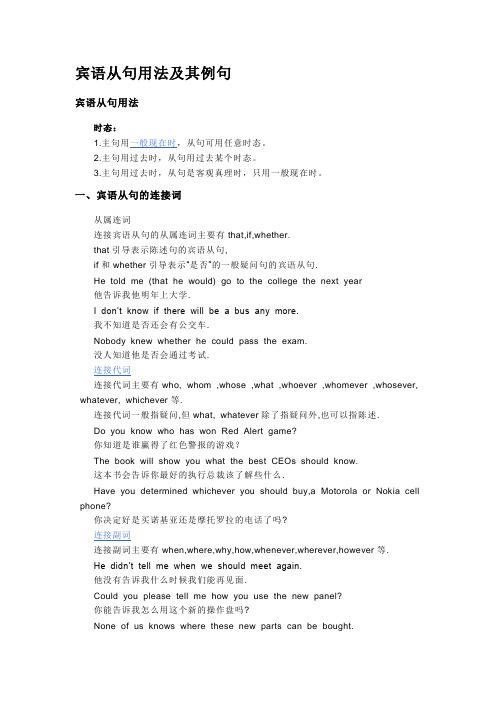
宾语从句用法及其例句宾语从句用法时态:1.主句用一般现在时,从句可用任意时态。
2.主句用过去时,从句用过去某个时态。
3.主句用过去时,从句是客观真理时,只用一般现在时。
一、宾语从句的连接词从属连词连接宾语从句的从属连词主要有that,if,whether.that引导表示陈述句的宾语从句,if和whether引导表示“是否”的一般疑问句的宾语从句.He told me (that he would) go to the college the next year他告诉我他明年上大学.I don’t know if there will be a bus any more.我不知道是否还会有公交车.Nobody knew whether he could pass the exam.没人知道他是否会通过考试.连接代词连接代词主要有who, whom ,whose ,what ,whoever ,whomever ,whosever, whatever, whichever等.连接代词一般指疑问,但what, whatever除了指疑问外,也可以指陈述.Do you know who has won Red Alert game?你知道是谁赢得了红色警报的游戏?The book will show you what the best CEOs should know.这本书会告诉你最好的执行总裁该了解些什么.Have you determined whichever you should buy,a Motorola or Nokia cell phone?你决定好是买诺基亚还是摩托罗拉的电话了吗?连接副词连接副词主要有when,where,why,how,whenever,wherever,however等.He didn’t tell me when we should meet again.他没有告诉我什么时候我们能再见面.Could you please tell me how you use the new panel?你能告诉我怎么用这个新的操作盘吗?None of us knows where these new parts can be bought.没有人知道这些的新的零件能在哪里买到.二、动词的宾语从句大多数动词都可以带宾语从句We all expect that they will win , for members of their team are strong er.我们都预料他们会赢,因为他们的队员更强壮.He told us that they would help us through the whole work.他告诉我们在整个工作中,他们都会帮忙的.部分“动词+副词”结构也可以带宾语从句I have found out that all the tickets for the concert have been sold out.我发现这场音乐会的所有票都卖光了.Can you work out how much we will spend during the trip?你能计算出这次旅行我们将花费多少钱吗?动词短语也可以带宾语从句常见的这些词有:make sure确保make up one’s mind下决心keep in mind牢记Make sure that there are no mistakes in your papers before you turn th em in.在上交试卷前确保没有任何错误.可运用形式宾语it代替的宾语从句①动词find,feel,consider,make,believe等后面有宾语补足语的时候,则需要用it 做形式宾语而将that宾语从句后置.I think it necessary that we take plenty of hot water every day .我认为每天多喝开水是有必要的.I feel it a pity that I haven’t been to the get-together.我没去聚会,感觉非常遗憾.I have made it a rule that I keep diaries.我每天写日记成了习惯.We all find it important that we (should) make a quick decision about t his mater.我们都认为对这件事马上做出决定很重要.②有些动词带宾语从句时需要在宾语与从句前加it这类动词主要有:hate, take , owe, have, see to.I hate it when they with their mouths full of food.我讨厌他们满嘴食物时说话.He will have it that our plan is really practical.他会认为我们的计划确实可行.We take it that you will agree with us.我们认为你会同意我们的.When you start the engine, you must see to it that car is in neutral.开启发动机时, 一定要使汽车的离合器处于空挡位置.③若宾语从句是wh-类,则不可用it代替We all consider what you said to be unbelievable.我们都认为你所说的是不可信的.We discovered what we had learned to be valuable.我们发现我们所学到的东西都是有用的.三、介词的宾语从句用wh-类的介词宾语从句We are talking about whether we admit students into our club.我们正在讨论是否让学生加入我们的俱乐部.The new book is about how Shenzhou 6 manned spaceship was sent u p into space.这本新书是关于神州6号载人航天飞船是如何升入太空的.用that,if引导的介词宾语从句有时候except,but,besides三个介词后可见到that引导的宾语从句I know nothing about my new neighbor except that he used to work wit h a company.对于我的新邻居我只知道他曾在一家公司上班,其他一无所知.四、形容词的宾语从句常用来引导宾语从句的形容词有: sure,certain,glad,please,happy,sorry,afraid,s atisfied,surprisedI am sure I will pass the exam.我确信我会通过考试.I am sorry that I have troubled you so long.很抱歉我这么长时间在打扰你.He is glad that Li Ming went to see him when he was ill.他很高兴在他生病的时候李明能去看望他.五、if,whether在宾语从句中的区别①if和whether在作“是否”解时,引导宾语从句常放在动词know,ask,care,wond er,find out等之后,介词后一般不用if②少数动词,如:leave,put,discuss,doubt后的宾语从句常用whether.③whether后可以加or not,但是if不可以.④在不定式前只能用whether.(如:I can’t decide whether to stay. 我不能决定是否留下。
(完整版)名词性从句用法归纳
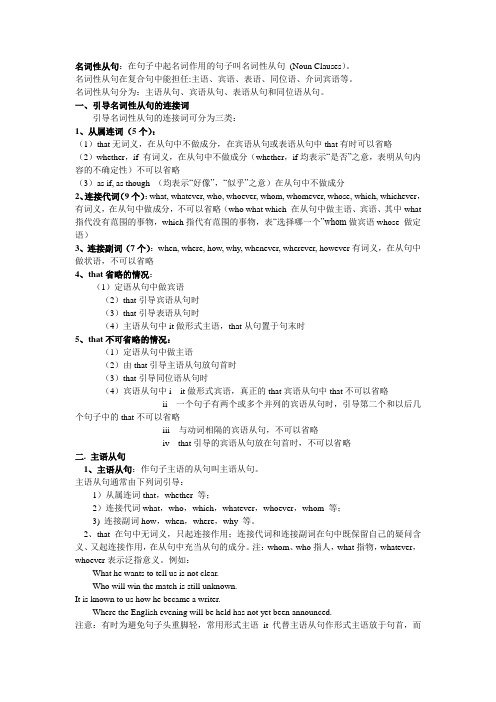
名词性从句:在句子中起名词作用的句子叫名词性从句(Noun Clauses)。
名词性从句在复合句中能担任:主语、宾语、表语、同位语、介词宾语等。
名词性从句分为:主语从句、宾语从句、表语从句和同位语从句。
一、引导名词性从句的连接词引导名词性从句的连接词可分为三类:1、从属连词(5个):(1)that无词义,在从句中不做成分,在宾语从句或表语从句中that有时可以省略(2)whether,if 有词义,在从句中不做成分(whether,if均表示“是否”之意,表明从句内容的不确定性)不可以省略(3)as if, as though (均表示“好像”,“似乎”之意)在从句中不做成分2、连接代词(9个):what, whatever, who, whoever, whom, whomever, whose, which, whichever,有词义,在从句中做成分,不可以省略(who what which 在从句中做主语、宾语、其中what 指代没有范围的事物,which指代有范围的事物,表“选择哪一个”whom做宾语whose 做定语)3、连接副词(7个):when, where, how, why, whenever, wherever, however有词义,在从句中做状语,不可以省略4、that省略的情况:(1)定语从句中做宾语(2)that引导宾语从句时(3)that引导表语从句时(4)主语从句中it做形式主语,that从句置于句末时5、that不可省略的情况:(1)定语从句中做主语(2)由that引导主语从句放句首时(3)that引导同位语从句时(4)宾语从句中i it做形式宾语,真正的that宾语从句中that不可以省略ii 一个句子有两个或多个并列的宾语从句时,引导第二个和以后几个句子中的that不可以省略iii 与动词相隔的宾语从句,不可以省略iv that引导的宾语从句放在句首时,不可以省略二. 主语从句1、主语从句:作句子主语的从句叫主语从句。
英语中宾语从句用法及例句总结(完整)

宾语从句用法及其例句宾语从句用法时态:1.主句用一般现在时,从句可用任意时态。
2.主句用过去时,从句用过去某个时态。
3.主句用过去时,从句是客观真理时,只用一般现在时。
一、宾语从句的连接词从属连词连接宾语从句的从属连词主要有that,if,whether.that引导表示陈述句的宾语从句,if和whether引导表示“是否”的一般疑问句的宾语从句.He told me (that he would) go to the college the next year他告诉我他明年上大学.I don’t know if there will be a bus any more.我不知道是否还会有公交车.Nobody knew whether he could pass the exam.没人知道他是否会通过考试.连接代词连接代词主要有who, whom ,whose ,what ,whoever ,whomever ,wh osever, whatever, whichever等.连接代词一般指疑问,但what, whatever除了指疑问外,也可以指陈述.Do you know who has won Red Alert game?你知道是谁赢得了红色警报的游戏?The book will show you what the best CEOs should know.这本书会告诉你最好的执行总裁该了解些什么.Have you determined whichever you should buy,a Motorola or Noki a cell phone?你决定好是买诺基亚还是摩托罗拉的电话了吗?连接副词连接副词主要有when,where,why,how,whenever,wherever,however 等.He didn’t tell me when we should meet again.他没有告诉我什么时候我们能再见面.Could you please tell me how you use the new panel?你能告诉我怎么用这个新的操作盘吗?None of us knows where these new parts can be bought.没有人知道这些的新的零件能在哪里买到.二、动词的宾语从句大多数动词都可以带宾语从句We all expect that they will win , for members of their team are stro nger.我们都预料他们会赢,因为他们的队员更强壮.He told us that they would help us through the whole work.他告诉我们在整个工作中,他们都会帮忙的.部分“动词+副词”结构也可以带宾语从句I have found out that all the tickets for the concert have been sold out.我发现这场音乐会的所有票都卖光了.Can you work out how much we will spend during the trip?你能计算出这次旅行我们将花费多少钱吗?动词短语也可以带宾语从句常见的这些词有:make sure确保make up one’s mind下决心 keep in mind牢记Make sure that there are no mistakes in your papers before you tur n them in.在上交试卷前确保没有任何错误.可运用形式宾语it代替的宾语从句①动词find,feel,consider,make,believe等后面有宾语补足语的时候,则需要用it做形式宾语而将that宾语从句后置.I think it necessary that we take plenty of hot water every day .我认为每天多喝开水是有必要的.I feel it a pity that I haven’t been to the get-together.我没去聚会,感觉非常遗憾.I have made it a rule that I keep diaries.我每天写日记成了习惯.We all find it important that we (should) make a quick decision abo ut this mater.我们都认为对这件事马上做出决定很重要.②有些动词带宾语从句时需要在宾语与从句前加it这类动词主要有:hate, take , owe, have, see to.I hate it when they with their mouths full of food.我讨厌他们满嘴食物时说话.He will have it that our plan is really practical.他会认为我们的计划确实可行.We take it that you will agree with us.我们认为你会同意我们的.When you start the engine, you must see to it that car is in neutral.开启发动机时, 一定要使汽车的离合器处于空挡位置.③若宾语从句是wh-类,则不可用it代替We all consider what you said to be unbelievable.我们都认为你所说的是不可信的.We discovered what we had learned to be valuable.我们发现我们所学到的东西都是有用的.三、介词的宾语从句用wh-类的介词宾语从句We are talking about whether we admit students into our club.我们正在讨论是否让学生加入我们的俱乐部.The new book is about how Shenzhou 6 manned spaceship was se nt up into space.这本新书是关于神州6号载人航天飞船是如何升入太空的.用that,if引导的介词宾语从句有时候except,but,besides三个介词后可见到that引导的宾语从句I know nothing about my new neighbor except that he used to work with a company.对于我的新邻居我只知道他曾在一家公司上班,其他一无所知.四、形容词的宾语从句常用来引导宾语从句的形容词有: sure,certain,glad,please,happy,sor ry,afraid,satisfied,surprisedI am sure I will pass the exam.我确信我会通过考试.I am sorry that I have troubled you so long.很抱歉我这么长时间在打扰你.He is glad that Li Ming went to see him when he was ill.他很高兴在他生病的时候李明能去看望他.五、if,whether在宾语从句中的区别① if和whether在作“是否”解时,引导宾语从句常放在动词know,ask,c are,wonder,find out等之后,介词后一般不用if②少数动词,如:leave,put,discuss,doubt后的宾语从句常用whether.③ whether后可以加or not,但是if不可以.④在不定式前只能用whether.(如:I can’t decide whether to stay. 我不能决定是否留下。
lecture 6(宾语从句)

第十一讲宾语从句两个句子连接方式1、句子的本质:英语中,一个句子有且只有一个谓语动词。
2、句子数量的判断标准:英语中,句子的数量由谓语动词的数量决定。
3、句子的分类:(2类)1)简单句:有且只有一个谓语动词;2)复合句:由两个或多个简单句构成,因此有多个谓语动词。
4、复合句的分类:(2类)1)并列句:无主从句之分;可独立存在。
2)主从句:有主从句之分;有主才有从。
5、复合句的连接方式:(3种)1)特殊标点符号:;:——(分冒破)2)连词:and, but, or, so3)连接词:what, which, who, whom, when, where…1.Help others whenever you can ____ you’ll make the world a nicer place to live.A.and B.or C.unless D.but2. Stop smoking, ____ you will get better soon.A.and B. or C.but D. after3. Money is important, ____ it’s not the most important thing.A.and B. but C.or D.so4. She can speak little English ____ she dare to talk with foreigners.A.so B. or C.as D.but5.Remember to return the book to the school library in time,____ you will be fine.A.or B. and C. but D. then6. Maria didn’t catch the last bus, ____ she had to walk home.A. becauseB.soC. but7. You’d better get up early in the morning, ____ you will miss the early bus.A.soB. andC. or主从句本质:所有主从句的三大本质:1)有主才有从,主从句相对而言;2)整个从句相当于一个词,从句类型由主句决定,与从句自身组成部分无关。
知识全解:第七专题 各种从句中常用的连接词
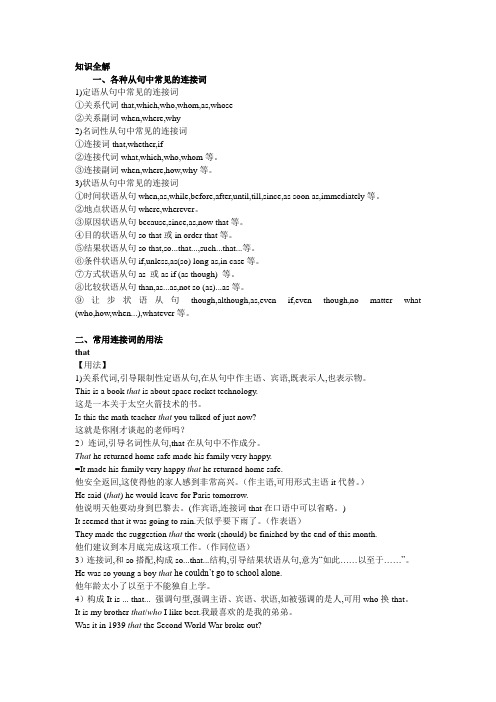
知识全解一、各种从句中常见的连接词1)定语从句中常见的连接词①关系代词that,which,who,whom,as,whose②关系副词when,where,why2)名词性从句中常见的连接词①连接词that,whether,if②连接代词what,which,who,whom等。
③连接副词when,where,how,why等。
3)状语从句中常见的连接词①时间状语从句when,as,while,before,after,until,till,since,as soon as,immediately等。
②地点状语从句where,wherever。
③原因状语从句because,since,as,now that等。
④目的状语从句so that或in order that等。
⑤结果状语从句so that,so...that...,such...that...等。
⑥条件状语从句if,unless,as(so) long as,in case等。
⑦方式状语从句as 或as if (as though) 等。
⑧比较状语从句than,as...as,not so (as)...as等。
⑨让步状语从句though,although,as,even if,even though,no matter what (who,how,when...),whatever等。
二、常用连接词的用法that【用法】1)关系代词,引导限制性定语从句,在从句中作主语、宾语,既表示人,也表示物。
This is a book that is about space rocket technology.这是一本关于太空火箭技术的书。
Is this the math teacher that you talked of just now?这就是你刚才谈起的老师吗?2)连词,引导名词性从句,that在从句中不作成分。
That he returned home safe made his family very happy.=It made his family very happy that he returned home safe.他安全返回,这使得他的家人感到非常高兴。
宾语从句用法详解
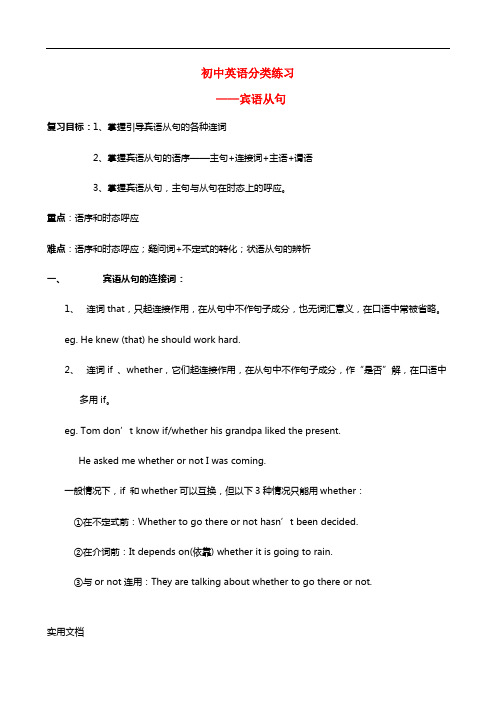
初中英语分类练习——宾语从句复习目标:1、掌握引导宾语从句的各种连词2、掌握宾语从句的语序——主句+连接词+主语+谓语3、掌握宾语从句,主句与从句在时态上的呼应。
重点:语序和时态呼应难点:语序和时态呼应;疑问词+不定式的转化;状语从句的辨析一、宾语从句的连接词:1、连词that,只起连接作用,在从句中不作句子成分,也无词汇意义,在口语中常被省略。
eg. He knew (that) he should work hard.2、连词if 、whether,它们起连接作用,在从句中不作句子成分,作“是否”解,在口语中多用if。
eg. Tom don’t know if/whether his grandpa liked the present.He asked me whether or not I was coming.一般情况下,if 和whether可以互换,但以下3种情况只能用whether:①在不定式前:Whether to go there or not hasn’t been decid ed.②在介词前:It depends on(依靠) whether it is going to rain.③与or not连用:They are talking about whether to go there or not.实用文档3、连接代词who, whom, whose, what, which,连接副词when, where, why, how,它们起连接作用,作句子成分,各有自己的意义。
eg. The teacher asked the new students which class he was in.I wonder where he got so much money.【注意】1、由连接代、副词引导的宾语从句可以和“疑问词+不定式”结构转化。
eg. I don’t know how I should do with the presents. I don’t know how to do with the presents.2、要注意区分判断由if、when引导的从句类型.二、宾语从句的语序:宾语从句的语序是陈述语序,即“连接词+主语+谓语+其它成分”。
完整版)状语从句(9种全)

完整版)状语从句(9种全)状语从句在复合句中起到修饰主句的作用,分为时间、地点、原因、目的、结果、条件、方式、比较、让步等种类。
1.时间状语从句时间状语从句的连接词包括when。
as。
while。
after。
before。
since。
ever since。
as soon as。
once。
till。
until。
whenever。
no sooner…than。
hardly/scarcely。
when。
the moment/minute/instant/second。
every time。
each time。
any time。
the first time。
next time。
last time。
all the time。
by the time。
directly。
immediately。
instantly等。
例如,“一···就···”的句型可以用as soon as或once引导,其中as soon as侧重时间或动作先后衔接紧,而once侧重条件,表示“一旦。
”;on doing sth/on one's + n.作时间状语,例如On arriving at the n。
the thief was arrested.意为“一到达车站,这个小偷就被逮捕了。
”2.地点状语从句地点状语从句的连接词包括where。
wherever。
anywhere。
everywhere等。
例如,I'll go wherever you go.意为“你去哪儿,我就跟你去哪儿。
”3.原因状语从句原因状语从句的连接词包括because。
since。
as。
now that。
seeing that。
considering that等。
例如,Since it's raining。
we'll stay indoors.意为“因为下雨,我们将待在室内。
英语宾语从句用法详解(初中)
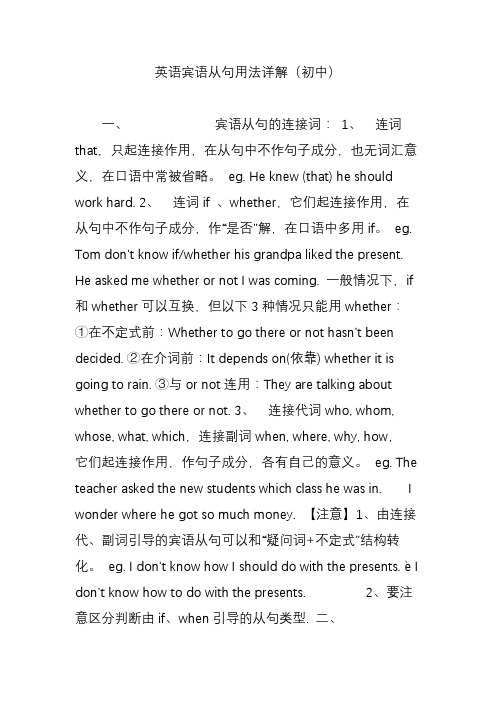
英语宾语从句用法详解(初中)一、宾语从句的连接词:1、连词that,只起连接作用,在从句中不作句子成分,也无词汇意义,在口语中常被省略。
eg. He knew (that) he should work hard. 2、连词if 、whether,它们起连接作用,在从句中不作句子成分,作“是否”解,在口语中多用if。
eg. Tom don’t know if/whether his grandpa liked the present. He asked me whether or not I was coming. 一般情况下,if 和whether可以互换,但以下3种情况只能用whether:①在不定式前:Whether to go there or not hasn’t been decided. ②在介词前:It depends on(依靠) whether it is going to rain. ③与or not连用:They are talking about whether to go there or not. 3、连接代词who, whom, whose, what, which,连接副词when, where, why, how,它们起连接作用,作句子成分,各有自己的意义。
eg. The teacher asked the new students which class he was in. I wonder where he got so much money. 【注意】1、由连接代、副词引导的宾语从句可以和“疑问词+不定式”结构转化。
eg. I don’t know how I should do with the presents. è I don’t know how to do with the presents. 2、要注意区分判断由if、when引导的从句类型. 二、宾语从句的语序:宾语从句的语序是陈述语序,即“连接词+主语+谓语+其它成分”。
(完整版)从句连接词判断方法
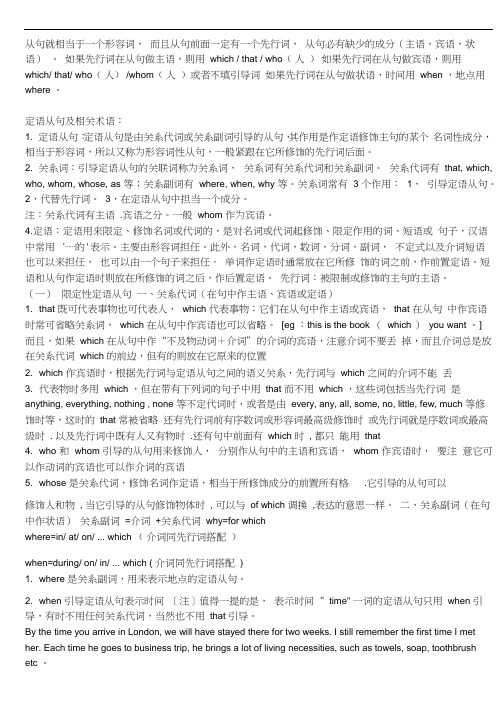
从句就相当于一个形容词,而且从句前面一定有一个先行词,从句必有缺少的成分(主语,宾语,状语)。
如果先行词在从句做主语,则用which / that / who(人)如果先行词在从句做宾语,则用which/ that/ who(人) /whom(人)或者不填引导词如果先行词在从句做状语,时间用when ,地点用where 。
定语从句及相关术语:1. 定语从句:定语从句是由关系代词或关系副词引导的从句,其作用是作定语修饰主句的某个名词性成分,相当于形容词,所以又称为形容词性从句,一般紧跟在它所修饰的先行词后面。
2. 关系词:引导定语从句的关联词称为关系词,关系词有关系代词和关系副词。
关系代词有that, which, who, whom, whose, as 等;关系副词有where, when, why 等。
关系词常有 3 个作用:1,引导定语从句。
2,代替先行词。
3,在定语从句中担当一个成分。
注:关系代词有主语.宾语之分。
一般whom 作为宾语。
4.定语:定语用来限定、修饰名词或代词的,是对名词或代词起修饰、限定作用的词、短语或句子,汉语中常用‘⋯⋯的'表示。
主要由形容词担任。
此外,名词,代词,数词,分词,副词,不定式以及介词短语也可以来担任,也可以由一个句子来担任.单词作定语时通常放在它所修饰的词之前,作前置定语。
短语和从句作定语时则放在所修饰的词之后,作后置定语。
先行词:被限制或修饰的主句的主语。
(一)限定性定语从句一、关系代词(在句中作主语、宾语或定语)1. that 既可代表事物也可代表人,which 代表事物;它们在从句中作主语或宾语,that 在从句中作宾语时常可省略关系词,which 在从句中作宾语也可以省略。
[eg :this is the book (which )you want 。
]而且,如果which 在从句中作“不及物动词+介词”的介词的宾语,注意介词不要丢掉,而且介词总是放在关系代词which 的前边,但有的则放在它原来的位置2. which 作宾语时,根据先行词与定语从句之间的语义关系,先行词与which 之间的介词不能丢3. 代表物时多用which ,但在带有下列词的句子中用that 而不用which ,这些词包括当先行词是anything, everything, nothing , none 等不定代词时,或者是由every, any, all, some, no, little, few, much 等修饰时等,这时的that 常被省略还有先行词前有序数词或形容词最高级修饰时或先行词就是序数词或最高级时. 以及先行词中既有人又有物时.还有句中前面有which 时, 都只能用that4. who 和whom 引导的从句用来修饰人,分别作从句中的主语和宾语,whom 作宾语时,要注意它可以作动词的宾语也可以作介词的宾语5. whose 是关系代词,修饰名词作定语,相当于所修饰成分的前置所有格.它引导的从句可以修饰人和物, 当它引导的从句修饰物体时, 可以与of which 调换,表达的意思一样。
(完整版)主语从句详解
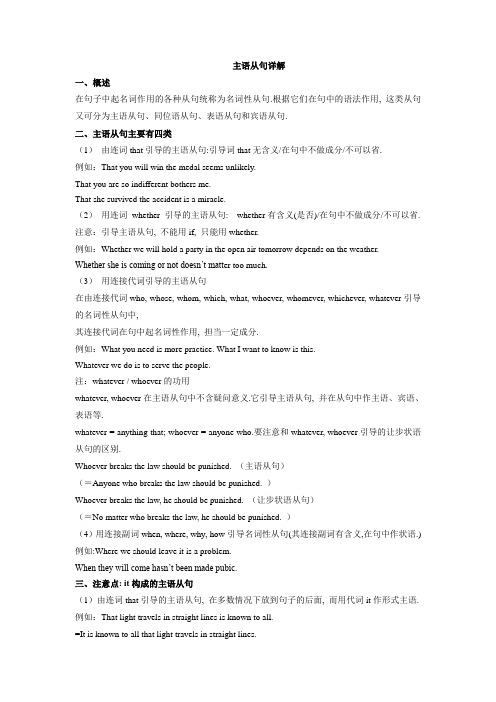
主语从句详解一、概述在句子中起名词作用的各种从句统称为名词性从句.根据它们在句中的语法作用, 这类从句又可分为主语从句、同位语从句、表语从句和宾语从句.二、主语从句主要有四类(1)由连词that引导的主语从句:引导词that无含义/在句中不做成分/不可以省.例如:That you will win the medal seems unlikely.That you are so indifferent bothers me.That she survived the accident is a miracle.(2)用连词whether 引导的主语从句: whether有含义(是否)/在句中不做成分/不可以省. 注意:引导主语从句, 不能用if, 只能用whether.例如:Whether we will hold a party in the open air tomorrow depends on the weather.Whether she is coming or not doesn’t matt er too much.(3)用连接代词引导的主语从句在由连接代词who, whose, whom, which, what, whoever, whomever, whichever, whatever引导的名词性从句中,其连接代词在句中起名词性作用, 担当一定成分.例如:What you need is more practice. What I want to know is this.Whatever we do is to serve the people.注:whatever / whoever的功用whatever, whoever在主语从句中不含疑问意义.它引导主语从句, 并在从句中作主语、宾语、表语等.whatever = anything that; whoever = anyone who.要注意和whatever, whoever引导的让步状语从句的区别.Whoever breaks the law should be punished. (主语从句)(=Anyone who breaks the law should be punished. )Whoever breaks the law, he should be punished. (让步状语从句)(=No matter who breaks the law, he should be punished. )(4)用连接副词when, where, why, how引导名词性从句(其连接副词有含义,在句中作状语.) 例如:Where we should leave it is a problem.When they will come hasn’t been made pubic.三、注意点: it构成的主语从句(1)由连词that引导的主语从句, 在多数情况下放到句子的后面, 而用代词it作形式主语. 例如:That light travels in straight lines is known to all.=It is known to all that light travels in straight lines.When the plane is to take off has not been announced .= It has not been announced when the plane is to take off.(但当what引导的主语从句表示“…的东西”时, 一般不用it作形式主语.)错:It is a book what he wants.对:What he wants is a book.另外, 需要注意的是, it作形式主语代替主语从句时, 要注意和as引导的定语从句的区别.试比较:It was reported that the US was under the terrorist attack.As was reported, the US was under the terrorist attack.(2)常见用it作形式主语的复合句结构A. It is +名词+从句It is a fact that… 事实是……It is good news that … ……是好消息It is a question that … ……是个问题It is common knowledge that … ……是常识类似的名词还有:a pity;a wonder;a good thing;no wonder;surprise等.例如:It is a mystery to me how it all happened.It is common knowledge that the whale is not a fish.It is no surprise that Bob should have won the game.It’s a pity that you missed the film.B. It is +形容词+从句It is necessary that … 有必要……It is clear that … 很清楚……It is likely that … 很可能……It is important that … 重要的是……类似的形容词还有:Strange; natural; obvious; true; good; wonderful; possible; unlikely; quite; unusual; certain; evident; worth-while; surprising; interesting; astonishing, etc.例如:It is doubtful whether she will be able to come.It was really astonishing that he refused to talk to you.It is essential that he should be here by the weekend.It seems obvious that we cannot go on like this.It is necessary that you (should)master the computer.It is important that a student learn English well.It is likely that a hurricane will arrive soon.需要注意的是, 这类主语从句中, 谓语动词很多为“(should)+动词原形”, 即要用虚拟语气.C. It is +过去分词+从句It is said that … 据说……It is reported that … 据报道……It has been proved that … 已证明……It must be pro ved that… 必须指出……类似的过去分词还有:known; estimated; expected; believed; thought; hoped; noted; discussed; required;decided; suggested; demanded; made clear; found out,etc.例如:It is thought that he is the best player.It is estimated that the vase is 2000 years old.It is used to be thought that a new star must be due to a collision between two stars.It has not been made clear when the new road is to be opened to traffic.It is said that he was killed in the earthquake.D. It seems(happened / appears / doesn’t matter / makes no difference / occurred …)that …It seems that they will win the game.It makes no difference whether he will attend the meeting or not.It does not matter if I missed my train.It happened that I saw him yesterday.主从练习1. _____ as much as one-fifth of all timber harvested is not used.A. The estimateB. The estimatedC. They are estimatedD. It is estimated that2. _____ some mammals came to live in the sea is not known.A. WhichB. SinceC. AlthoughD. How3. _____ we have achieved is attributed to the guidance of our parents.A. WhoeverB. WhateverC. HoweverD. That4. _____ wealthy does not necessarily mean that a man is greedy.A. For the reason that he isB. Just because he isC. The reason of beingD. That he is5. Although ___ happened in this developed country sounds like science fiction, it could occur elsewhere in the world.A. whichB. whatC. howD. it6. _____ she had forgotten to take her notebook.A. That occurred to herB. She occurred thatC. To her that occurredD. It occurred to her that7. I am sure that _____ she said is wrong.A. whichB. allC. thisD. what8. We lost our way in the forest, and ____ made matters worse was that it was getting dark.A. thatB. whichC. itD. What9. _____ or not is still uncertain.A. He’s comingB. If he is comingC. That comingD. Whether he’s coming10. It’s _____ he’ll be able to come.A. doubt whetherB. doubtfulC. doubt itD. doubtful whether11. ______ he is at work in the heart of the big city or at home in the quiet suburb, Dick’s l ife is tied to machines.A. WhetherB. TillC. IfD. Unless12. _____ he saw both surprised and frightened him.A. ThatB. WhenC. WhatD. Which13. _____ is warm sunshine.A. What do we all need.B. What all we needC. What we needD. What we all need14. _____ is a pity that he should feel so upset.A. WhatB. ThatC. HeD. It15. _____ a spoonful of soil can tell us so much about the structure and early history of the moon.A. RemarkableB. Quite remarkablyC. It is remarkable thatD. It is remarkable fact that16. _____ you nominate will be elected.A. WhoB. WhomC. WhomeverD. That’s17. _____ book you borrow must be returned within a week.A. WhatB. WhichC. WhicheverD. That’s18. _____ of us gets home first starts cooking.A. WhoB. WhichC. WhicheverD. Anyone1.________ makes mistakes must correct them.A. WhatB. ThatC. WhoeverD. Whatever2. It worried her a bit ____ her hair was turning grey.A. whileB. thatC. ifD. for3.When and why he came here ________ yet.A. is not knownB. are not knownC. has not knownD. have not known4. ________ is no reason for dismissing her.A. Because she was a few minutes lateB. Owing to a few minutes lateC. The fact that she was a few minutes lateD. Being a few minutes late5. ________ Tom liked to eat was different from ________.A. That…that you had expectedB. What …that you had expectedC. That…what you had expectedD. What…what you had expected6.________ we go swimming every day ________ us a lot of good.A. If...doB. That...doC. If...doesD. That...does7.It ________ Bob drives badly.A. thinks thatB. is thought whatC. thought thatD. is thought that8.It's uncertain ________ the experiment is worth doing.A. ifB. thatC. whetherD. how9.________ the boy didn't take medicine made his mother angry.A. ThatB. WhatC. HowD. Which10.____ we can't get seems better than ____ we have.A. What, whatB. What, thatC. That, thatD. That, what11.____ you don't like him is none of my business.A. WhatB. WhoC. ThatD. Whether12..____ we'll go camping tomorrow depends on the weather.A. IfB. WhetherC. ThatD. Where13._________is going to do the job will be decided by the Party committee.A. ThatB. WhyC. HowD. Who14._______we'll finish translating the book depends on the time.A. WhenB. WhyC. WhatD. That15.______he won't go there is clear to all of us.A. HowB. WhatC. WhyD. This16.______the house will be built will be discussed at tomorrow's meeting.A. IfB. WhereC. ThatD. What17._______you come or not is up to you.A. WhatB. IfC. WhyD. Whether18._______makes mistakes must correct them.A. WhoB. AnyoneC. WhoeverD. Anybody19._______team will win the match is a matter of public concern.A. WhichB. ThatC. IfD. How20. Who is this factory __________ some foreign friends visited last Friday?A. thatB. whereC. whichD. the one21.Is this factory you visited the other day?A. thatB. whereC. in whichD. the one22.________leaves the room last ought to turn off the lights.A. AnyoneB. The personC. WhoeverD.Who表语从句1、概述用作表语的从句叫作表语从句, 它位于主句中的连系动词之后.引导表语从句的词有从属连词that、whether、as though(if);关系代词who, what, which, whom, whose, whatever, whoever, whomever, whichever等;关系副词when, where, why, how, however, whenever, wherever等.可以接表语从句的连系动词由be, look, remain, seem等.That引导表语从句时, 在口语中, 间或可以省略.The trouble is that we are short of money.困难是我们资金短缺.That is why stone walls are used instead of fences around New England fields.这就是为什么在新英格兰用石头墙而不用栅栏的原因.At that time, it seemed as if I couldn't think of the right word anyhow.当时,我似乎怎么也想不出一个恰当的字眼来.2、由从属连词that, whether引导的表语从句.that在引导表语从句时无词义, 而whether有词义, 意为、“是否”.这时主句的主语常常是些抽象名词, 如question(问题), trouble(麻烦), problem(问题), result(结果), chance(可能性), suggestion(建议), idea(想法), reason(理由)等.表语从句对主句主语进行说明、解释, 使主语的内容具体化.The trouble is (that) she has lost his money. 麻烦的事是他丢了钱.The question is whether we need more ice cream.问题是我们是否还需要一些冰淇淋.The problem was that it was too valuable for everyday use.问题是它作为日常之用太贵重了. What she couldn’t understand was that fewer and fewer students showed interest in her l essons. 我们不能理解越来越少的学生对他的课不感兴趣.3、由关系代词引导的表语从句.关系代词who, what, which, whom, whose, whatever, whoever, whomever, whichever等引导表语从句, 在句中作主语、宾语、表语, 关系代词不能省略.The question is which of us should go.问题是我们哪一个应该去.The problem was who could do the work.问题是谁能做这项工作.That's what he is worrying about.那就是他在担心的事.That's what we should do.那是我们应该做的.4、由关系副词引导的表语从句.Go and get your coat. It's where you left it. 去把雨衣拿来.就在你原来放的地方.I had neither a raincoat nor an umbrella. That’s why I got wet through. 我们既没伞也没雨衣, 这是我们淋湿的原因.That is how mice ruin many stores of grain every year.那就是老鼠是怎样每年损害大量粮食的. That is what he is worried about.那就是他所担心的.5、由连词because, as if/as though等引导的表语从句.It looked as if it was going to snow.看起来好像要下雪了.That's because we never thought of it.这是因为我们从未想过此事.It see ms as if he didn’t know the answer.好像他不知道答案.可以接表语从句的系动词有:1:be(being,been,am,is,are,was,were)2: feel , seem , look, appear ,sound,taste , smell3: stand , lie , remain ,keep, stay4: become ,get , grow , turn ,go ,come, run,fall5: prove, turn out系动词的固定搭配:come true, fall asleep, fall ill, go bad, come right, run wild连接词:that / whether /as if /asthough (if不引导表语从句)连接代词:who / whom / whose / which/ what连接副词:when / where / why / how /because注:引导表语从句的连词that间或可以省略.The truth is(that)I didn't go there. 事实是我没去那儿.[考题1]The traditional view is ____ we sleep because our brain is “programmed” to make us do so.A. whenB. whyC. whetherD. that[答案] D[解析]下划线处之后是包含一个原因状语从句的表语从句, 如果看不出它是充当整个句子结构的表语从句将难以把握整个句子的意思.因此, 应选择可引导名词性从句且不充当任何成分的that.[考题2]You are saying that everyone should be equal, and this is ____ I disagree.A. whyB. whereC. whatD. how[答案] B[解析]下划线处的引导词引导系动词is后的表语从句并在该表语从句中充当地点状语(“disagree”属于不及物动词, “I disagree”本身是完整的主谓结构), 下划线应填入引导词where, 表语从句“where I disagree”的意思是“我不同意之处、我不同意的地方”.[考题3]— I drove to Zhuhai for the air show last week.— Is that ____ you had a few days off?A. whyB. whenC. whatD. where[答案] A[解析]下划线处的引导词引导与系动词is连用的表语从句并在该表语从句中充当原因状语, 下划线应填入表示“因此……”(指因某种原因所造成的结果)的引导词why.[考题4]____ she couldn’t understand was ____ fewer and fewer students showed interest in her lessons.A. What; whyB. That; whatC. What; becauseD. Why; that[答案] A[解析]第一个下划线处的引导词引导主语从句并在该主语从句中充当宾语, 特指她所不理解的事情, 应填入关系代词型的引导词what;第二个下划线处表示“因此……”(指因某种原因所造成的后果, 由why引导对应的名词性从句)而不是“为什么……”(指原因、理由, 由because引导对应的名词性从句), 应填入引导词why.[考题5]____ made the school proud was ____ more than 90% of the students had been admitted to key universities.A. What; becauseB. What; thatC. That; whatD. That; because[答案] B[解析]第一个下划线处的引导词引导主语从句并在该主语从句中充当主语, 特指令校方骄傲的事情, 应选用关系代词型的引导词what;第二个下划线处引导表语从句表示原因、理由, 应由that引导对应的名词性从句.[考题6]—Are you still thinking about yesterday’s game?—Oh, that’s ____.A. what makes me feel excitedB. whatever I feel excited aboutC. how I feel about itD. when I feel excited[答案] A[解析]A选项的意思是“令我感觉激动的事物”;B选项的意思是“我觉得激动的任何事物”;C选项的意思是“我对它感觉的方式”;D选项的意思是“令我感觉激动的时间”.四个选项中A最适合跟代表“game”的主语that对应, 充当表语从句.表语从句与宾语从句的关系不属于的宾语从句和表语从句都属于名词性从句.其作用跟名词在句中的作用相同.故充当宾语的句子叫宾语从句, 充当表语的句子叫表语从句.宾语从句(1)对于宾语从句要掌握以下三点①语序: 从句的语序必须是陈述句语序, 即“主语+ 谓语”这种形式.②时态: 当主句是一般现在时或一般将来时的时候, 从句可以是任何时态, 而当主句是一般过去时的时候, 从句, 从句时态必须是过去时范围的时态, 即(一般过去时, 过去进行时, 过去完成时, 过去将来时).③连接词: 当从句意思完整, 主句意思肯定时, 连接词用that, 且可以省去, 当从句意思完整, 主句意思不确定或含否定含意时, 常用if或whether(是否), 当从句意思不完整时, 连接词则是代替不完整部分的特殊疑问词.表语从句在句子中起表语作用的从句叫做表语从句, 位于主句系动词的后面.表语从句的引导词和主语从句的引导词相同.也是名词性从句的一种.如:What the police want to know is when you enred red the room警察想知道的是你什么时候进的房间.The The trouble is that we are short of funds困难是我们缺乏资金.This This is what we should do这是我们应当做的.That”s s why I want you to work there那就是我要你在那儿工作的原因.His His first question was whether Mr. Smith had arrived yet他的第一个问题是史密斯先生到了没有.注意:从句中的疑问句用正常语序, 即陈述语序.as as if, as though, becau也可用来引导表语从句.She She seems as if she had done a great thing她看起来好像做了一件大事.It It is because you eat too much那是因为你吃得太多了.表从练习一1. The question is ________ we will have our sports meet next week.A. thatB. ifC. whenD. whether 2.The reason why he failed is ________he was too careless.A. becauseB. thatC. forD. because of3. Go and get your coat. It’ s ________you left itA. whereB. thereC. there whereD. where there 4.The problem is _________to take the place of TedA. who can we getB. what we can getC. who we can getD. that we can get5. What I want to know is ______ he likes the gift given by us.A. thatB. ifC. whetherD.不填6. The reason is_________I missed the bus.A. thatB. whenC. whyD. what7. That is __ ___ we were late last time.A. thatB. whenC. whyD. what8. She looked _________ she were ten years younger.A. thatB. likeC. asD. as though9.—I fell sick!--I think it is _______ you are doing too much.A. whyB. whenC. whatD. because10. The reason why he hasn’t come is ___________.A. because his mother is illB. because of his mother’s being illC. that his mother is illD. for his mother is ill11. —He was born here.-- That is _______ he likes the place so much.A. thatB. whatC. whyD. how12.That is ______ Lu Xun once lived.A. whatB. whereC. thatD. Why二1._______your father wants to know is________ getting on with your studies.A. What; how are youB. That;how you areC. How;that you areD. What;how you are2. The trouble is__________we are short of tools.A. whatB. thatC. howD. why that3. America was __________was first called “India” by Columbus.A. whatB. whereC. the placeD. there where4. China is becoming stronger and stronger. It is no longer_________ .A. what it used to beB. what it was used to beingC. what it used to beingD. what it was used to be5. ________he really means is ________he disagrees with us.A. What … thatB. That … whatC. What … whatD. That … what6. The energy is ________ makes the cells able to do their work.A. thatB. whichC. whatD. Such三1. I drove to Zhuhai for the air show last week .—Is that_____ you had a few days off?A. why B .what C. when D. where2. I had neither a raincoat nor an umbrella ____I got wet through.A. It’s the reasonB. That’s whyC. There’s whyD. It’s how3. See the flags on top of the building? That was ______ we did this morning.A. whenB. whichC. whereD. what4. --- Are you still thinking about yesterday’s game?---Oh, that’s _____.A. what makes me feel excitedB. whatever I feel excited aboutC. how I feel about itD. when I feel excited5. What surprised me was not what he said but ______ he said it.A. the wayB. in the way thatC. in the wayD. the way which1.The question is ________ we will have our sports meet next week.A. thatB. ifC. whenD. whether 2.The reason why he failed is ________he was too careless.A. becauseB. thatC. forD. because of3. Go and get your coat. It’ s ________you left itA. whereB. thereC. there whereD. where there 4.The problem is _________to take the place of TedA. who can we getB. what we can getC. who we can getD. that we can get5. What I want to know is ______ he likes the gift given by us.A. thatB. ifC. whetherD.不填6. The reason is_________ I missed the bus.A. thatB. whenC. whyD. what7. That is __ ___ we were late last time.A. thatB. whenC. whyD. what8. She looked _________ she were ten years younger.A. thatB. likeC. asD. as though9.—I fell sick!--I think it is _______ you are doing too much.A. whyB. whenC. whatD. because10. The reason why he hasn’t come is ___________.A. because his mother is illB. because of his mother’s being illC. that his mother is illD. for his mother is ill11. —He was born here.-- That is _______ he likes the place so much.A. thatB. whatC. whyD. how12.That is ______ Lu Xun once lived.A. whatB. whereC. thatD. why 13._______your father wants to know is________ getting on with your studies.A. What; how are youB. That;how you areC. How;that you areD. What;how you are14. The trouble is__________ we are short of tools.A. whatB. thatC. howD. why that15. America was __________was first called “India” by Columbus.A. whatB. whereC. the placeD. there where16. China is becoming stronger and stronger. It is no longer_________ .A. what it used to beB. what it was used to beingC. what it used to beingD. what it was used to be17. ________he really means is ________he disagrees with us.A. What … thatB. That … whatC. What … whatD. That … what18. The energy is ________ makes the cells able to do their work.A. thatB. whichC. whatD. such19 —I drove to Zhuhai for the air show last week.—Is that_____ you had a few days off?A. why B .what C. when D. where20 .I had neither a raincoat nor an umbrella ____I got wet through.A. It’s the reasonB. That’s whyC. There’s whyD. It’s how21. See the flags on top of the building? That was ______ we did this morning.A. whenB. whichC. whereD. what22. --- Are you still thinking about yesterday’s game?---Oh, that’s _____.A. what makes me feel excitedB. whatever I feel excited aboutC. how I feel about itD. when I feel excited23. What surprised me was not what he said but ______ he said it.A. the wayB. in the way thatC. in the wayD. the way which综合练习1. It has been proved _________ eating vegetables in childhood helps to protect you against serious illnesses in later life.A. ifB. becauseC. whenD. that2. The last time we had great fun was ________ we were visiting the Water Park.A. whereB. howC. whenD. why3. ________ matters most in learning English is enough practice.A. WhatB. WhyC. WhereD. Which4. The traditional view is ______ we sleep because our brain is “programmed” to make use do so.A. whenB. whyC. whetherD. that5. ______ parents say and do has a life-long effect on their children.A. ThatB. WhichC. WhatD. As6.________ is our belief that improvements in health care will lead to a stronger, more prosperous economy.A. AsB. ThatC. ThisD. It7. ______ team wins on Saturday will go through to the national championships.A. No matter whatB. No matter whichC. WhateverD. Whichever8. You are saying that everyone should be equal, and this is ______ I disagree.A. whyB. whereC. what .D how9. After Yang Liwei succeeded in circling the earth, ____ our astronauts desire to do is walk in space.A. whereB. whatC. thatD. how10. I think Father would like to know ______ I’ve been up to so far, so I decide to send him a quick note.A. whichB. whyC. whatD. how11. Our country is developing at an amazing speed, and this is ______ makes me feel so proud.A. whatB. whichC. thatD. why12. ________ puzzles the scientists how these creatures can survive in such severe conditions.A. WhatB. AsC. ThatD. It13. _____ leaves the room last ought to turn off the lights.A. AnyoneB. WhoC. WhoeverD. The person14. Inside the White House, there is a room called the Oval Office. That’s _______ the president works.A. wheyB. whenC. whatD. where15. ______ you will be admitted to York University will be decided by the Admission Committee.A. ThatB. WhetherC. WhatD. If16. The reason ____ I plan to go is _____ she will be disappointed if I don’t.A. why; thatB. that; becauseC. which; becauseD. why; for17. We sell handmade gifts. _____gift you order from us is unique for the special person!A. WhichB. ThatC. WhicheverD. What。
宾语从句讲解及练习
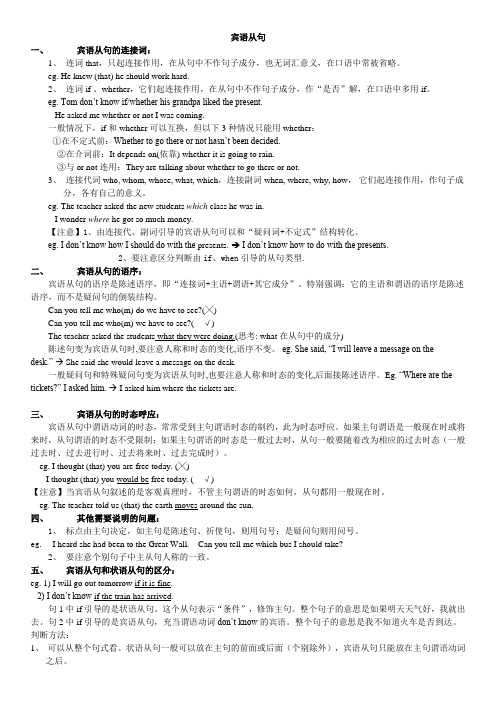
宾语从句一、宾语从句的连接词:1、连词that,只起连接作用,在从句中不作句子成分,也无词汇意义,在口语中常被省略。
eg. He knew (that) he should work hard.2、连词if 、whether,它们起连接作用,在从句中不作句子成分,作“是否”解,在口语中多用if。
eg. Tom don’t know if/whether his grandpa liked the present.He asked me whether or not I was coming.一般情况下,if 和whether可以互换,但以下3种情况只能用whether:①在不定式前:Whether to go there or not hasn’t been decided.②在介词前:It depends on(依靠) whether it is going to rain.③与or not连用:They are talking about whether to go there or not.3、连接代词who, whom, whose, what, which,连接副词when, where, why, how,它们起连接作用,作句子成分,各有自己的意义。
eg. The teacher asked the new students which class he was in.I wonder where he got so much money.【注意】1、由连接代、副词引导的宾语从句可以和“疑问词+不定式”结构转化。
eg. I don’t know how I should do with the presents. →I don’t know how to do with the presents.2、要注意区分判断由if、when引导的从句类型.二、宾语从句的语序:宾语从句的语序是陈述语序,即“连接词+主语+谓语+其它成分”。
(完整版)名词性从句用法归纳

名词性从句:在句子中起名词作用的句子叫名词性从句(Noun Clauses)。
名词性从句在复合句中能担任:主语、宾语、表语、同位语、介词宾语等。
名词性从句分为:主语从句、宾语从句、表语从句和同位语从句。
一、引导名词性从句的连接词引导名词性从句的连接词可分为三类:1、从属连词(5个):(1)that无词义,在从句中不做成分,在宾语从句或表语从句中that有时可以省略(2)whether,if 有词义,在从句中不做成分(whether,if均表示“是否”之意,表明从句内容的不确定性)不可以省略(3)as if, as though (均表示“好像”,“似乎”之意)在从句中不做成分2、连接代词(9个):what, whatever, who, whoever, whom, whomever, whose, which, whichever,有词义,在从句中做成分,不可以省略(who what which 在从句中做主语、宾语、其中what 指代没有范围的事物,which指代有范围的事物,表“选择哪一个”whom做宾语whose 做定语)3、连接副词(7个):when, where, how, why, whenever, wherever, however有词义,在从句中做状语,不可以省略4、that省略的情况:(1)定语从句中做宾语(2)that引导宾语从句时(3)that引导表语从句时(4)主语从句中it做形式主语,that从句置于句末时5、that不可省略的情况:(1)定语从句中做主语(2)由that引导主语从句放句首时(3)that引导同位语从句时(4)宾语从句中i it做形式宾语,真正的that宾语从句中that不可以省略ii 一个句子有两个或多个并列的宾语从句时,引导第二个和以后几个句子中的that不可以省略iii 与动词相隔的宾语从句,不可以省略iv that引导的宾语从句放在句首时,不可以省略二. 主语从句1、主语从句:作句子主语的从句叫主语从句。
- 1、下载文档前请自行甄别文档内容的完整性,平台不提供额外的编辑、内容补充、找答案等附加服务。
- 2、"仅部分预览"的文档,不可在线预览部分如存在完整性等问题,可反馈申请退款(可完整预览的文档不适用该条件!)。
- 3、如文档侵犯您的权益,请联系客服反馈,我们会尽快为您处理(人工客服工作时间:9:00-18:30)。
1.定语从句:定语从句是由关系代词或关系副词引导的从句,其作用是作定语修饰主句的某个名词性成分,相当于形容词,所以又称为形容词性从句,一般紧跟在它所修饰的先行词后面。
2.关系词:引导定语从句的关联词称为关系词,关系词有关系代词和关系副词。关系代词有that, which, who, whom, whose, as等;关系副词有where, when, why等。关系词常有3个作用:1,引导定语从句。2,代替先行词。3,在定语从句中担当一个成分。
2. which作宾语时,根据先行词与定语从句之间的语义关系,先行词与which之间的介词不能丢
3. 代表物时多用which,但在带有下列词的句子中用that而不用which,这些词包括当先行词是anything, everything, nothing , none等不定代词时,或者是由every, any, all, some, no, little, few, much等修饰时等,这时的that常被省略 还有先行词前有序数词或形容词最高级修饰时,或先行词就是序数词或最高级时.以及先行词中既有人又有物时.还有句中前面有which时,都只能用that
二、关系副词(在句中作状语)
关系副词=介词+关系代词
whyபைடு நூலகம்for which
where=in/ at/ on/ ... which (介词同先行词搭配)
when=during/ on/ in/ ... which (介词同先行词搭配)
1. where是关系副词,用来表示地点的定语从句。
2. when引导定语从句表示时间〔注〕值得一提的是,表示时间“time"一词的定语从句只用when引导,有时不用任何关系代词,当然也不用that引导。
先行词:被限制或修饰的主句的主语。
(一)限定性定语从句
一、关系代词(在句中作主语、宾语或定语)
1. that既可代表事物也可代表人,which代表事物;它们在从句中作主语或宾语,that在从句中作宾语时常可省略关系词,which在从句中作宾语也可以省略。[eg:this is the book (which)you want。]而且,如果which在从句中作“不及物动词+介词”的介词的宾语,注意介词不要丢掉,而且介词总是放在关系代词which的前边,但有的则放在它原来的位置
This novel, which I have read three times, is very touching. 这本小说很动人,我已经读了三遍。
3.非限制性定语从句还能将整个主句作为先行词, 对其进行修饰, 这时从句谓语动词要用第三人称单数,例如:
He seems not to have grasped what I meant, which greatly upsets me. 他似乎没抓住我的意思,这使我心烦。
3. 当从句的逻辑主语是some, any, no, somebody, anybody, nobody, something, anything, everything或nothing时,常用there is来引导
There is somebody here who wants to speak to you. 这里有人要和你说话。
注:关系代词有主语.宾语之分。一般whom作为宾语。
4.定语:定语用来限定、修饰名词或代词的,是对名词或代词起修饰、限定作用的词、短语或句子,汉语中常用‘……的’表示。主要由形容词担任。此外,名词,代词,数词,分词,副词,不定式以及介词短语也可以来担任,也可以由一个句子来担任.单词作定语时通常放在它所修饰的词之前,作前置定语。短语和从句作定语时则放在所修饰的词之后,作后置定语。
By the time you arrive in London, we will have stayed there for two weeks. I still remember the first time I met her. Each time he goes to business trip, he brings a lot of living necessities, such as towels, soap, toothbrush etc。
(二)非限定性定语从句
非限定性定语从句的作用是对所修饰的成分作进一步说明,通常是引导词和先行词之间用逗号隔开,将从句拿掉后其他部分仍可成立
1. which引导的非限定性定语从句来说明前面整个句子的情况或主句的某一部分
2.当先行词是专有名词或物主代词和指示代词所修饰时,其后的定语从句通常是非限制性的,例如:
从句就相当于一个形容词,
而且从句前面一定有一个先行词,
从句必有缺少的成分(主语,宾语,状语)。
如果先行词在从句做主语,则用which / that / who(人)
如果先行词在从句做宾语,则用which/ that/ who(人) /whom(人)或者不填引导词
如果先行词在从句做状语,时间用when,地点用where。
Liquid water changes to vapor, which is called evaporation. 液态水变为蒸汽,这就叫做蒸发。
4. 有时as也可用作关系代词
5. 在非限定性定语从句中,不能用关系副词why和关系代词that,而用who, whom代表人,用which,whose代表事物.;
Charles Smith, who was my former teacher, retired last year. 查理·史密斯去年退休了,他曾经是我的老师。
My house, which I bought last year, has got a lovely garden. 我去年买的的那幢房子带着个漂亮的花园。
4. who和whom引导的从句用来修饰人,分别作从句中的主语和宾语,whom作宾语时,要注意它可以作动词的宾语也可以作介词的宾语
5. whose是关系代词,修饰名词作定语,相当于所修饰成分的前置所有格.它引导的从句可以修饰人和物, 当它引导的从句修饰物体时, 可以与 of which 调换,表达的意思一样。
